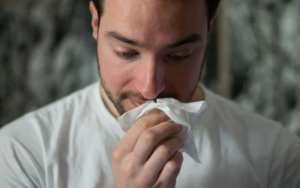
Tips on Relieving Pain Between Shoulder Blades
A detailed overview of the most effective tips for relieving pain between shoulder blades.
Share
Share
Allergic rhinitis, sometimes known as hay fever, affects about 10% of adults and causes sneezing, sniffling, and itchy eyes. Allergies often start to flare up in the spring as flowers blossom and pollen fills the air, but the worst might happen when summer arrives and you’re still stuffy, sniffling, sneezing, and generally unhappy.
Summer allergy season lasts after the Spring has passed. There are, however, ways to mitigate the effects, protect yourself, and determine what kind of treatment you may require. When it comes to seasonal allergies, knowing is half the battle, so here are a few things to keep in mind so you can spend less time sneezing and more time enjoying the sun this summer.

Summer allergies are prevalent, and they are caused by the same allergens that cause allergies in other seasons.
Sinus congestion, runny nose, sneezing, coughing, and itchy or watery eyes are all common allergy symptoms. Due to post-nasal drip, another common symptom of pollen or mold allergies, allergies can produce a sore throat. Mucus may build up in your sinuses and leak down your throat, producing coughing and a raw, scratchy throat.

A fever, combined with a cough or shortness of breath, is one of the most common symptoms of COVID-19. Allergies do not create a fever, which is one of the most important distinctions between allergies and COVID-19 patients to understand. A cold may only happen a few times a year, but allergies are seasonal and are triggered by your triggers.
Grass pollen, which reaches moderate to high levels throughout the summer months, is the most common cause of summer allergies. Ragweed is a major allergy trigger in the fall, but it also blooms in late July and August. Other allergy triggers throughout the summer include mold spores and stinging insects. You and your family may encounter more insects and environmental allergies when you spend more time outside, but you may restrict exposure to reduce symptoms.

Hay fever occurs when your immune system misconstrues a normally harmless airborne chemical as harmful. It reacts by releasing histamines and other chemicals into your bloodstream in response to that substance, or allergen. The symptoms of an allergic reaction are caused by these substances.
Pollen is the most common allergen. By late April, Culprit Trees are usually done with their pollen-fest. Summer allergies are triggered by grasses and weeds.
When stinging insects such as bees, wasps, yellow jackets, hornets, fire ants, and other insects, allergic reactions can occur. A run-in with one of them if you have a severe allergy could result in a life-threatening situation.
Summer pollution might exacerbate your symptoms. Ozone at ground level is one of the most common. It’s made up of a combination of sunlight and chemicals from car exhaust in the atmosphere. Strong sunlight and calm winds create ozone clouds around some cities during the summer.

Seasonal allergies can cause mild to severe symptoms. Among the most common are:
Symptoms that are less prevalent include:
Many people who suffer from hay fever also suffer from asthma. Seasonal allergens may induce an asthma attack if you have both hay fever and asthma. Consider seeking certified medical assistance incase symptoms persist.

Avoiding allergens that cause hay fever and year-round allergic rhinitis is the best treatment for hay fever and year-round allergic rhinitis. Hay fever symptoms can also be treated with medications thanks to technology innovations. Alternative treatments are also used by certain persons.
When you can’t avoid your allergens, there are other options, such as:
Drowsiness, dizziness, and disorientation are all possible adverse effects of some allergy treatments.

Exercise does not have to be strenuous or difficult. Simple exercises keep your circulation moving and help you get rid of irritating allergies. It’s important not to overwork oneself, especially during allergy season. Overdoing physical activity, may increase rather than alleviate symptoms of Allergy, Asthma, and Immunology.
When pollen counts and pollution levels are high, remain inside.
Close all of your doors and windows. To keep allergies at bay, turn on your air conditioner. Invest in an air purifier.
Clean your air filters in your home regularly. Clean bookshelves, vents, and other pollen-collecting areas as well.
You don’t have to suffer through the spring and summer with a stuffy nose—take control of your allergies and say goodbye to seasonal symptoms. At Raycome we offer expert advice on the use of medical devices , get in touch with us,we will be happy to help.

A detailed overview of the most effective tips for relieving pain between shoulder blades.

A detailed overview of the various forms of summer allergies and how to defeat them

A detailed overview of the Keto diet, its effects on hypertension, and the available better diet options.

A detailed description of what tennis elbow is, its symptoms, causes, and use of laser treatment to treat tennis elbow.
![]()
Shenzhen Raycome Health Technology Co., Ltd
Address: No.501, Block B, Xinfeng Building, Yangguang Community, Xili Street, Nanshan Dist, Shenzhen.518055, China.
Tel: (86) 755 2663 3509 (International Line)
Tel: (86) 755 2663 3519 (国内业务专线)
Email: sales@raycome.com
Web: www.raycome.com

 Tips on Relieving Pain Between Shoulder Blades
Tips on Relieving Pain Between Shoulder Blades 